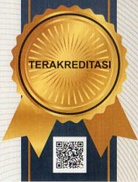Analisis Pelatihan, Disiplin Kerja, Remunerasi, dan Motivasi Berprestasi dengan Kepuasan Kerja Sebagai Variabel Intervening terhadap Kinerja Karyawan
Abstract
This study aims to analyze the training, work discipline, remuneration, achievement motivation with job satisfaction as an intervening variable on employee performance. Research respondents are the employees PT. Plantation Milano Panai Tengah Labuhanbatu of 61 respondents with sampling using slovin formula. Sources and data collection techniques used in this study are primary data, to wit data obtained or collected directly from the source data through interviews and a list of questions given to the respondents. The data analysis technique used SEM (Stuctural Equation Modeling) with SmartPLS program. R square value is known that job satisfaction variable and employee performance can be explained by training variables, work discipline, remuneration and achievement motivation equal to 67,8%, and 61,2%. The result of Path Coefficients with Statistics (O / STDEV) used to examine the analysis of training, work discipline, remuneration, achievement motivation on employee performance with job satisfaction as intervening variable. The results showed that the training had positive and insignificant effect on job satisfaction. Discipline has positive and insignificant effect on job satisfaction. Remuneration has a positive and insignificant effect on job satisfaction. Achievement motivation has a positive and significant impact on job satisfaction. Training has a positive and insignificant effect on employee performance. Achievement motivation has positive and insignificant effect on employee performance and job satisfaction have positive and significant effect to employee performance.
Keywords
Full Text:
PDFReferences
Arikunto, S. 2012. Prosedur Penelitian Suatu Pendekatan Praktek. Yogyakarta :Rineka Cipta.
De Pora Antonio. 2011. Remunerasi (Kompensasi dan Benefit). Jakarta : Penerbit Rana Pustaka.
Dessler, Gary, 2009. Manajemen Sumber Daya Manusia. Jakarta: Indeks.
Gomes, Faustino Cardoso, 2003. Manajemen Sumber Daya Manusia, Edisi Pertama, Cetakan Kelima, Yogyakarta : Andi Offset.
Ghozali, Imam, 2006. Aplikasi Analisis Multivariate dengan program SPSS. Semarang: Badan Penerbit Universitas Diponegoro.
Ghozali, Imam, dan Latan Hengky 2015. Partial Least Square Konsep, Teknik, dan Aplikasi menggunakan Program SmartPLS 3.0 Semarang: Badan Penerbit Universitas Diponegoro.
Handoko, T. H. 2012. Manajemen Personalia dan Sumber Daya Manusia. Yogyakarta: BPFE.
Ivancevich, John M, Robert Konopaske dan Michael T Matteso, 2009. Perilaku dan Manajemen Organisasi, Edisi Ketujuh, Jakarta : Erlangga.
Malhotra, Naresh K. 2009, Basic Marketing Research: A Decision–Making Approach, third edition, New Jersey: Prentice-Hall, Pearson Education Inc. Upper Saddle River.
Mangkunegara, Anwar Prabu. 2007. Sumber Daya Perusahaan. Bandung: Remaja Rosdakarya.
Sekaran, Uma. 2011. Research Methods for business Edisi I and 2. Jakarta: Salemba Empat.
Sugiyono. 2011. Metode Penelitian Kuantitatif, Kualitatif dan R&D. Bandung: Afabeta.
Syamsuri, Abd. Rasyid, 2012, Analisis Pengaruh Pendidikan, Pengawasan Kerja dan Disiplin terhadap Kinerja Pegawai Dinas Pendidikan Kabupaten Mandailing Natal’, Tesis, Universitas Sumatera Utara.
DOI: https://doi.org/10.32487/jshp.v2i2.470
Refbacks
- There are currently no refbacks.
JSHP: Jurnal Sosial Humaniora dan Pendidikan
is licensed under a Creative Commons Attribution-ShareAlike 4.0 International License (CC BY-SA 4.0)




